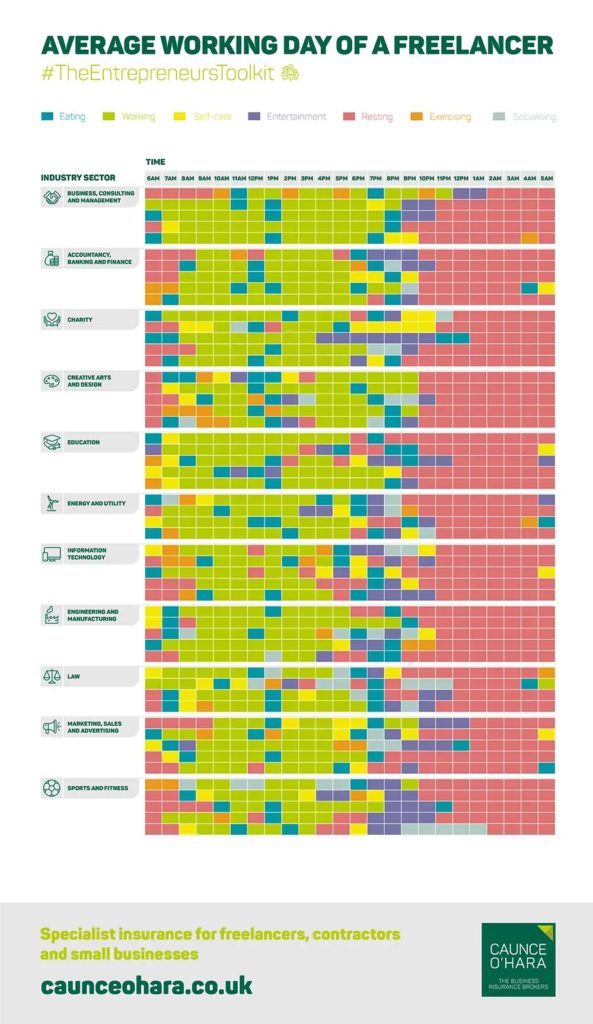Delegation: how to delegate like a pro to earn more money and achieve work-life balance
A Caunce O’Hara survey of 200 reveals exactly how freelancers are managing their time and how they could better develop the essential business building and life balancing tool of delegation.
The most successful freelancers and small business owners often have one key skill in common: they know how to delegate. They scale their businesses quicker than others and seem to have more time to spend with friends and family while also doing the things they love (besides work).
For some people delegation is easy, but for most freelancers, delegation is hard to action. That’s often because a freelancer’s reputation is built solely off the back of their relationships with clients and customers, which makes it hard to let go.
The first step to delegation: learning to let go
Sarah Townsend, freelance copywriter and author of Survival Skills for Freelancers, knows a thing or two about delegation, something she admits she once had a hard time doing. In her book, she takes us through the minefield of ‘should I, shouldn’t I?’ of delegation as a freelancer and equally the rewards you could reap once you harness it.
Townsend recalls when the penny dropped.
“Being a control freak with a fundamental inability to ask for help in all areas of my life, I attempted to do everything myself for the first 15 years of running my business…It was only when my home needed decorating that the penny dropped.”
Sarah Townsend, author Survival Skills for Freelancers
She compared some sums: her day rate versus what she would be paying the decorator. Then she compared what it would cost her in lost revenues by doing the job herself yet in twice the time as the decorator and probably half the quality. In the end, she chose to outsource the job to the decorator.
“I didn’t love decorating, I wasn’t particularly good at it and it didn’t make me money.”
She then took this scenario further by asking herself which other tasks did she not like doing that cost her time. The tasks (and unpaid hours) started adding up: IT, accounts, admin…
Townsend then came up with an equation:
As much time as possible doing the things that make you money
+
As little time as possible doing the things that don’t
=
The secret to freelance success
Townsend discusses further in her book among a host of topics how she became better at delegating and asking for advice and support over the course of her freelance career. She also shares how other freelancers have done it too based on their business sector.

Delegation and work-life balance are therefore interlinked. A key skill to running a successful business is being able to strike a good work-life balance, too, a sentiment echoed by Tom and Sian of Chatsworth Bakehouse:
“Your typical 9-5 allows for clearly defined work dedicated hours. If you’re doing something you love, it’s yours – there’s a tendency to have zero boundaries with your personal versus work time. Running your own business means being fully responsible for the day-to-day as well as the back end. It’s all-consuming but brilliant.”
Freelancers must learn “how” to let go of some tasks so that they can outsource non-essential tasks to experts such as accountants and marketing specialists, admin assistants, fellow freelancers, interns, apprentices and/or employees. Over time, they will see which people are best placed to take on more essential tasks. But if they never delegate, they are more likely to stifle their chances of experiencing life-changing revenues and personal growth.
Delegation, therefore, should be perceived as an investment as well as a time management tool that has to be learned and developed over time, according to a new report by Caunce O’Hara. Once you gain a delegator’s mindset it will free up your time for the most important tasks to build your business, perfect your customer relationships and enjoy that all-important downtime.
Freelancer tools that help you delegate
Philip Bacon, of Bacon Marketing, advises investing in a good time management tool to help you stay on top of your workload and effectively manage your to-do list.
“We use two-time management tools, ClickUp to manage our projects and activities, including project specific communications, then Clockify to track time being spent, to make sure clients are billed correctly.”
Philip Bacon, of Bacon Marketing
How do you spend your time compared to other freelancers?
To drill down further into the work-life balance of entrepreneurs, Caunce O’Hara asked 200 self-employed people what their typical working day looks like in order to showcase what a perfect work-life balance looks like to different people. The insurance broker then plotted the working days of respondents across 11 industries into a data visualisation, here’s what they discovered.
- It seems most entrepreneurs are satisfied with their work-life balance. When asked to rate their work-life balance out of 10 (with 1 being very unhappy and 10 being very happy), 86% of respondents answered between 5 and 10, with 14% answering 10.
- The majority of entrepreneurs are managing to keep their weekends free, with only 30% working Saturdays and 20% working Sundays. In contrast, Monday was the most popular day for working, with 89% of respondents saying they put hours in at the start of the week.
- A large majority of those polled (89%) suggested they were happier freelancing than being employed. Those in the 45-54 age group were the happiest of all with this career choice, with 97% saying they preferred this style of working.

Other freelancer skills that will help you delegate and grow
Financial literacy and leadership qualities are both highlighted within Caunce O’Hara’s toolkit, however, according to Marc Churchouse, CEO of the Mercator Group two skills that are essential to starting a business is the ability to forward plan and self-learn.
Churchouse explains:
“Forward planning is essential when starting a business. You need to make your processes as robust and scalable as possible because when you get to the point of needing them in their entirety you will be time-poor.
It’s not possible to predict every eventuality but if you can standardise your back-office processes as much as possible it will stand you in good stead.”
He goes on to say it’s important for people planning to start a business to take on as much information as they can in the early days and to surround themselves with good advisors – especially those who have already lived the journey. That way you can pick and choose what lessons you want to apply to your own journey.
If you want to delegate effectively you will have to work on becoming an effective leader. The most successful businesspeople have a talent for getting employees, investors, customers and others to buy into their visions and to share their excitement for what their companies have to offer. In essence, they are extensions of yourself and your passion.
It’s important to be aware that strong leadership isn’t all about dictating; it’s also about listening to colleagues and nurturing talent.
Start-ups are often highly collaborative environments, and leaders who know how to harness the skills and experiences of their workers stand to achieve the best results.
Caunce O’Hara Entrepreneur’s Tool Kit
Highlighting the importance of this issue, a global study carried out by The Workforce Institute at UKG and Workplace Intelligence found that 74% of employees believe they are more effective in their roles when they feel heard in the workplace.
Many of the most capable entrepreneurs are also thought leaders. Those who challenge accepted norms and find different approaches to problems tend to come up with the most innovative business ideas.
It can be hard to know where to start if you want to become a more effective business leader, but there are practical steps you can take to enhance your skill set.
For example, the government-funded Help To Grow Management Course is designed to enable entrepreneurs to hone various important capabilities, including leadership, innovation and employee engagement.
Here are some other areas to work on whether you are just starting out or want to scale up your revenues or offer more products or services to your business:
Skills you need to maintain your business
– The ability to delegate
– Striking a good work-life balance
– Effective time management
– Positive customer relationships
Skills you need to grow your business
– Strong marketing instincts
– Adaptability
– Appropriate risk tolerance
– Patience


